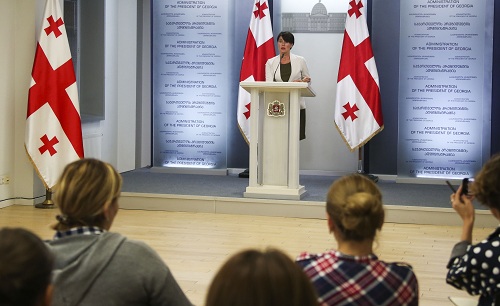
President Offers Consultations on Parliamentary Chairman’s Veto Proposal

Eka Mishveladze, President Margvelashvili’s Spokesperson, September 27, 2017. Photo: Presidential Administration
President Giorgi Margvelashvili offered the ruling and opposition parties to meet on September 28 at the presidential palace and discuss Parliamentary Chairman Irakli Kobakhidze’s proposal on vetoing certain provisions in the newly adopted constitution.
Speaking to reporters on September 27, Kobakhidze expressed hope that the President would “demonstrate his constructive position” and veto the clauses related to the bonus system and the electoral blocs, which would enable the ruling party to reflect additional changes in the constitution without initiating a new round of constitutional amendments.
Kobakhidze’s statement follows his earlier announcement that the ruling party would submit to the Parliament a legislative proposal allowing the parties to form electoral blocs for the next parliamentary elections in 2020, and scrapping the so called bonus system from 2024, which entails the transfer of votes of the parties that fail to cross the threshold entirely to the winner.
Commenting the proposal on September 27, Eka Mishveladze, the President’s spokesperson, stressed that Giorgi Margvelashvili’s goal “has always been the adoption of a consensus-based constitution,” and added that the President would like to invite for consultations the Georgian Dream and all political parties engaged in the constitutional reform process.
In response, Mamuka Mdinaradze, chairman of the Georgian Dream faction, accused the President of “yet another PR campaign,” and said the Georgian Dream would be willing to conduct a meeting between Giorgi Margvelashvili and the parliamentary majority, adding that the ruling party “is ready to explain the reasonability of its proposal to the President.”
The Parliament approved on September 26 amendments to the constitution on its third and final reading.
According to the current constitution, the President has to sign the new constitution within ten days or veto it and return to the Parliament with his objections. The President’s objections will then be put to vote and if they are accepted by the Parliament, the final version of the draft constitution will be re-submitted to the President for signature.